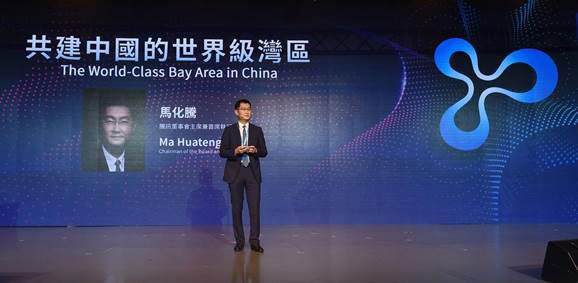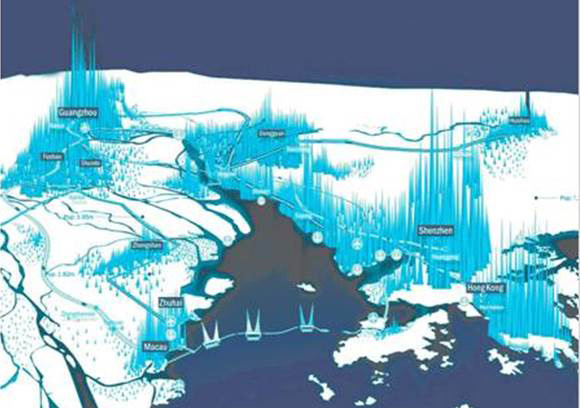Regional development is a core tenet of China's future policymaking, and in this context, public opinion has mainly focused on the area around Beijing, presupposing that "non-core" functions of the capital will all be transferred to the Xiong'an New Area in Baoding, Hebei. However, southern areas, such as Guangdong, Shenzhen and Hong Kong, have been quietly pursuing a plan which imagines the region transformed into a San Francisco "Bay Area"-like innovation hub. As the region of China which first got in line with international business norms, these lofty ambitions shouldn't be overlooked.
0-30 years in the future, when people talk about the Asian technology sector, they may not think of the technology manufacturing corridor in Taiwan stretching from the Neihu Technology Park all the way to the Hsinchu Science and Industrial Park, but might instead think of the "Bay Area" centered around the mouth of the Pearl River, principally comprising Guangdong, Hong Kong and Macao.
The idea of a region comprising Guangdong, Hong Kong and Macao first appeared in officialdom in March of this year, in a government work report authored by Chinese Premier Li Keqiang. In that report he stated, "research the formulation of development plan for a bay area regional city in the Guangdong, Hong Kong and Macao area". June 20 saw the first "Bay Area" forum held in Hong Kong, hosted by Shenzhen-based internet giant Tencent. Other attendees included Shenzhen-based drone company DJI, Zhuhai-based Gree Electric Appliances and Shenzhen-based courier service SF Express, all of which have made their mark on the region.
PCT applications from the Guangdong, Hong Kong and Macao region outstrip those from South Korea
Figure 1: Tencent founder Pony Ma presiding over the opening of the Guangdong,
Hong Kong and Macao Bay Area Forum

Source: Tencent Finance
As may have been clear from the use of the term "Bay Area", the proposed objective of the plan is to form a global center for tech startups similar to the Bay Area of San Francisco. And, in fact, currently the region is a technology leader. The region saw the highest number of patent applications in China, and according to data from Fan Gang, the president of the China Development Institute, it accounted for 15.3% of licensing nationwide, and corporate PCT applications amounted to over half the national total. If this region were a country, its PCT applications would rank it in sixth place globally, surpassing South Korea, with its mobile phone giants LG and Samsung.
Of course, between Guangdong, Hong Kong and Macao, the most significant, of course, are Hong Kong and Shenzhen. The former is an international metropolis, while the latter saw the launch of China's reform and opening up and was one of it's main beneficiaries. From the perspective of industrial development, Hong Kong and Shenzhen cooperate more than they compete with one another. Examples of this include the fact that it wasn't until software company Tencent went public on the Hong Kong index that it was able to become a social media software giant and that DJI began as the brainchild of a student of the Hong Kong University of Science and Technology, but was only founded when he started the business in Shenzhen. It is Hong Kong's international status and Shenzhen's technological innovation that serve as the two critical pillars for startups.
Manufacturing supply chains and the availability of investors and financing give Guangdong, Hong Kong and Macao region its greatest advantage
Another of the region's advantages is that it has a complete industry chain and financing platforms. Although the Bay Area of San Francisco has received global recognition for its innovation, if companies need to manufacture hardware, they will likely have to find a supplier in Asia; and if they successfully set up their business and want to go public, they can only do this if they find an investment banker in a city like New York. However, the cities of Dongguan, Zhongshan and Zhuhai surrounding Shenzhen and Hong Kong are technology manufacturing strongholds; The global OEM giant Foxconn is also headquartered in Shenzhen. If a company needs financing, Shenzhen is home to China's biggest venture capital firm, Shenzhen Capital Group; and if they want to go public, they can choose between the Shenzhen Stock Exchange and the Stock Exchange of Hong Kong. Any demands startups might have can be satisfied within the region.
Figure 2: The Guangdong, Hong Kong and Macao Bay Area's
industrial ecosystem is already quietly taking shape

Source: 'Technology Innovation and Metropolitan Transformation - China's Great Bay Area', Fan Gang, Guangdong, Hong Kong and Macao Bay Area Forum, June 6, 2017
After the example of Silicon Valley, Tencent's Pony Ma and DJI's chair Li Zexiang proposed plans to improve on the Guangdong, Hong Kong and Macao Bay Area. Ma stated that after the Hong Kong-Zhuhai-Macao road bridge opens to traffic at the end of this year, transport time between the two banks of the Pearl River Bay will be dramatically reduced, and the entire greater bay area will become part of the milieu of daily life. When the costs of transport are reduced, he suggests that a regular communication mechanism on policy be established between Guangdong, Hong Kong and Macao, to enable the establishment of policies designed to be more competitive in terms of attracting talent, for example, providing green cards for high-performing professionals, to eliminate the obstacles to labor flow, in addition to individual income tax subsidies and exemptions, to induce professional talent to work in the Bay Area region.
Li Zexiang approached the topic from an academic perspective, suggesting that the key to Silicon Valley's success was the industry-academia cooperation mechanism launched by Stanford University, but the universities in Guangdong, Hong Kong and Macao don't have strong enough links with industry, for example, the core pillar of Hong Kong's economy has always been finance and real estate, which means that science and engineering talent the universities cultivate have to leave the city after graduating to find work. Therefore, he suggests taking advantage of Hong Kong's agile regulatory system to build a private university specializing in cultivating startup talent. Then after graduation, students can be channelled to Shenzhen and Dongguan to create a startup, and only then can China's "Silicon Valley" be created.
Although all of this is still very much in the discussion stages, Taiwan should be concerned; as don't forget, another country that is trying to claim the title of Asia's Silicon Valley is Taiwan!
 |
|
| Author: |
Clarence Chiang |
| Current Post: |
Senior Editor, NAIP Newsletter |
| Education: |
Business Administration, National Chengchi University, Taiwan |
| Experience: |
Reporter, CommonWealth Magazine
Reporter, Business Today Magazine |
|
|
|
| Facebook |
|
Follow the IP Observer on our FB Page |
|
|
|
|
|
|

